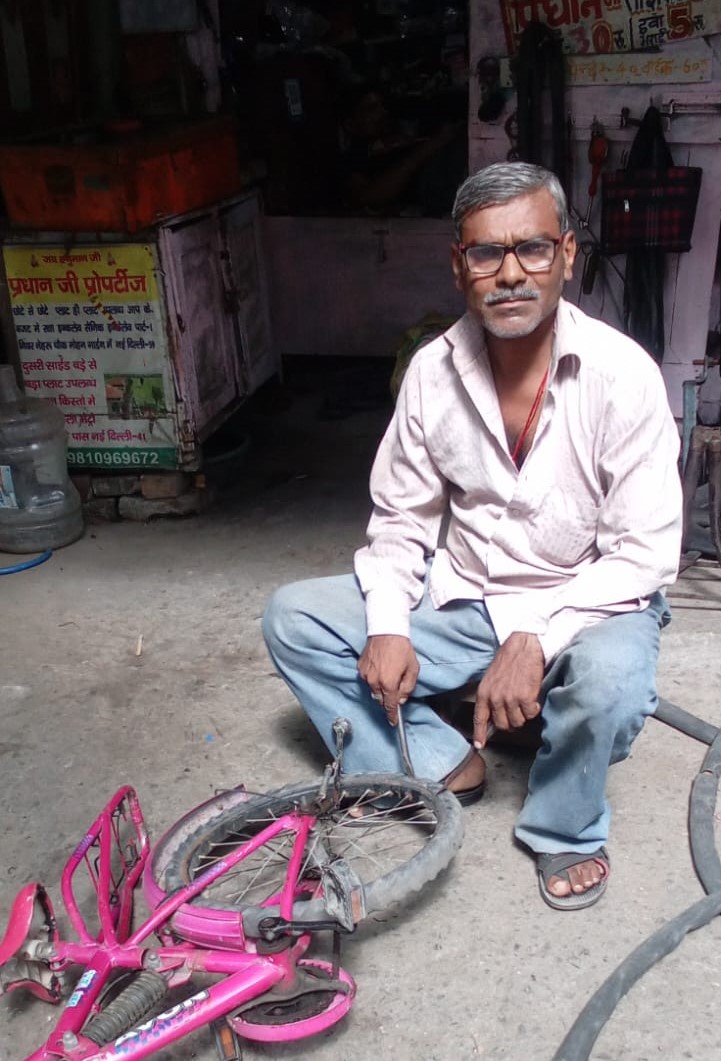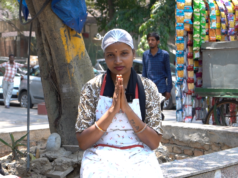Jai Prakash, a street vendor, made the journey from Chapra, Bihar, to Delhi, driven by the desire to create opportunities for his family. Having established his cycle repair shop in Vikaspuri West Delhi in 1978, he had already woven a rich tapestry of service to the local community.
Jai Prakash has all the essential documentation, such as the Certificate of Vending (COV) and Letter of Recommendation (LOR) given by the Municipal Corporation of Delhi (MCD). These certificates confirm his legal status as a street vendor. In 2018, Jai Prakash was elected as a Town Vending Committee member from the West Zone TVC 2. However, it did not give him immunity or any sense of relief against the corrupt officials at local government offices. This story revolves around the demolition of his shop and goods seized despite valid documents, and his fight for justice and recognition, putting his struggles as a street vendor in focus.
The Incident: Unjust Eviction and Seizure of a Street Vendor’s Cart
An incident took place on 7 March 2023. On this day, the MCD came unannounced and unexpectedly removed Jai Prakash’s Shop, which has been at the same location since 1978, and seized his vending cart. Despite possessing valid documents, his shop was dislodged without prior notice or explanation, sparking concerns about due process and the rights of street vendors. Jai Prakash diligently presented his legal documents to the MCD, demonstrating his compliance with regulations. However, his pleas were disregarded, and authorities resorted to force. The value of Jai Prakash’s vending cart, estimated at 3000 rupees, extended beyond monetary worth, representing years of dedication, his family’s livelihood, and his integral role within the local community.
The next day, when he went to get his vending carts released from MCD, they asked him to pay a fine of Rs. 4000. The amount may seem meagre to some, however, for a cart priced at Rs 3000, the penalty of Rs.4000 was unjustified by all means. He felt let down by the system. Feeling cheated, humiliated and defeated, he returned and shared the incident with his friends, asking them for their advice. This was not happening to Jai Prakash for the first time. Previously, Jai Prakash was forced to pay hefty fines, which were incurred on him based on baseless claims, and he was contemplating resigning to his fate of being violated quite regularly.
Assistance: Mobilising Support for Street Vendors Through Legal Intervention of Jeevika App
Since Jai Prakash was a TVC member, the Jeevika App team had contacted him earlier to share about its legal awareness and aid services. This time after his rights were violated again by the Municipal Corporation of Delhi (MCD), Jai Prakash knew he had support available. Through the app, Jai Prakash complained and got connected to the Jeevika team from Centre for Civil Society. With the help of the Jeevika team, Jeevika Fellows were sent to Jai Prakash, who heard his grievances and prepared a case fact sheet for him. The case was filed in the Delhi High Court on 13 July 2023, and on 20 July 2023, Jai Prakash got a stay order from the Delhi High Court. After careful deliberation, the Judge passed an order in his favour.
Jai Prakash, high on justice, went to the MCD with the court’s order to get his vending cart released. His dreams soon came crashing down when the MCD refused to release his vending cart without paying a substantial fine. Jai Prakash tried rationalising with them while saying that he is a member of TVC and he should not have to pay to get his vending cart back, but his plea fell on the corrupt official’s deaf ears. The spat continued for a while, and eventually, Jai Prakash convinced MCD to release his cart without any fine. Jai Prakash’s thirst for justice was hence quenched. Despite this incident, he is undeterred and continues to advocate for street vendor recognition and rights in his local community and among the Town Vending Committee.
Upholding Street Vendors’ Rights and Combating Corruption
According to the Street Vendors Act of 2014, every street vendor who has been issued a certificate of vending under subsection (1) of Section 3 of the Street Vendors Act receives an identity card to undertake vending operations. If a vendor is left out of the survey, local officials cannot evict them. Alternatively, law enforcement must provide a 30-day notice to the vendor before eviction. If eviction occurs, the Act states that authorities must provide alternate locations for vendors to continue their vending activity. Despite this, official agencies such as the police and the Municipal Corporation continue harassing and evicting vendors illegally. The Act prohibits such actions.
This highlights the impending need to enforce the Act and hold corrupt officials accountable for their actions. Jai Prakash’s story is not an isolated event. One can visit other articles in this periodical to see how many other Street Vendors have similar stories and have been affected by this slacking off of executive entities in our country. It is about time that grievances and issues of weaker sections of our society are given a voice. Without this, our reality will be no different than a horror movie. Jai Prakash’s story doesn’t end here. He continues to be an active Street Vending community member and participates in processions promoting street vendors’ rights.
Read the full story of Bhupender’s Battle for Justice, another street vendor in Delhi.
Post Disclaimer
The opinions expressed in this essay are those of the authors. They do not purport to reflect the opinions or views of CCS.






